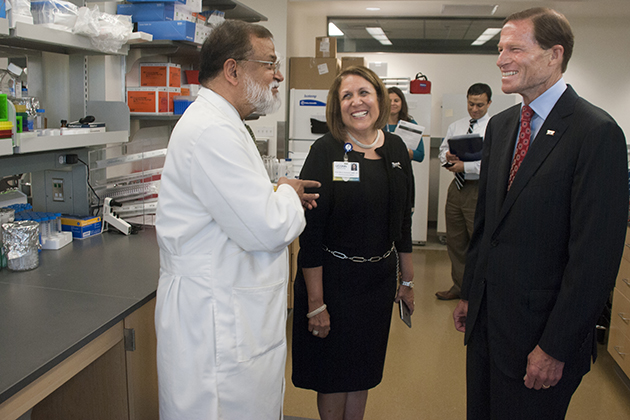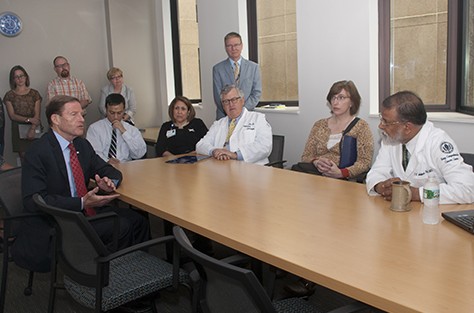
During a visit to the Farmington campus Tuesday, U.S. Sen. Richard Blumenthal met with UConn Health officials to discuss the important role data registries will play in the future of health care in Connecticut and across the country, and learned about UConn Health’s groundbreaking research in the individualized treatment of cancer.

UConn Health’s chief of cardiothoracic surgery and vice chair for quality improvement, Dr. Stephen Lahey, and the CEO of John Dempsey Hospital, Anne Diamond explained in their presentation to the Senator that UConn Health is committed to providing truly transparent, fully accountable, and highest quality care based on data analysis, and evaluated against national benchmarks.
All health care stakeholders, organizations, providers, insurers, and patients, have questions related to the medical care they are receiving or providing, Lahey said. The answers to these questions should be accessible in registries that provide patients the data they need to make informed health care decisions and allow health care organizations to report and benchmark their quality measures against other providers.
“Beyond participation in national data registries, it will be the changes in clinical practice, based on rigorous data analysis that will define meaningful improvements in health care delivery,” Lahey noted. “The commitment to total outcome transparency will be anxiety-provoking at first but, in the end, it will be the ‘quality tide’ that raises all boats: improved patient outcomes, optimal practitioner performance, and value-added, highest quality care that third-party payers will demand.”
Immunology professor Dr. Pramod Srivastava, director of the Neag Comprehensive Cancer Center, and his colleagues provided the Senator with a tour of the newly renovated state-of-the-art research labs, made possible through the state’s investment in the Bioscience Connecticut initiative. They also discussed advances in genomics technology that have enabled researchers to sequence the entire DNA of any individual quickly and cheaply. These advances are poised to transform cancer treatment because they allow for treatment to be tailored to the particular patient. Srivastava’s team is currently engaged in clinical trials of vaccines for patients with advanced stage ovarian cancer.
Whereas most cancer genomics work elsewhere is designed to use the genomics information to assess the type of chemotherapy that may be best suited for a patient, UConn Health researchers are leading the way in comparing the entire DNA sequence of a patient’s healthy tissues with the entire DNA sequence of the cancer, Srivastava said: “We are not looking for any certain types of differences, but for any and all differences. Based on these differences, we are making individualized vaccines to treat that particular cancer of that particular patient.”



